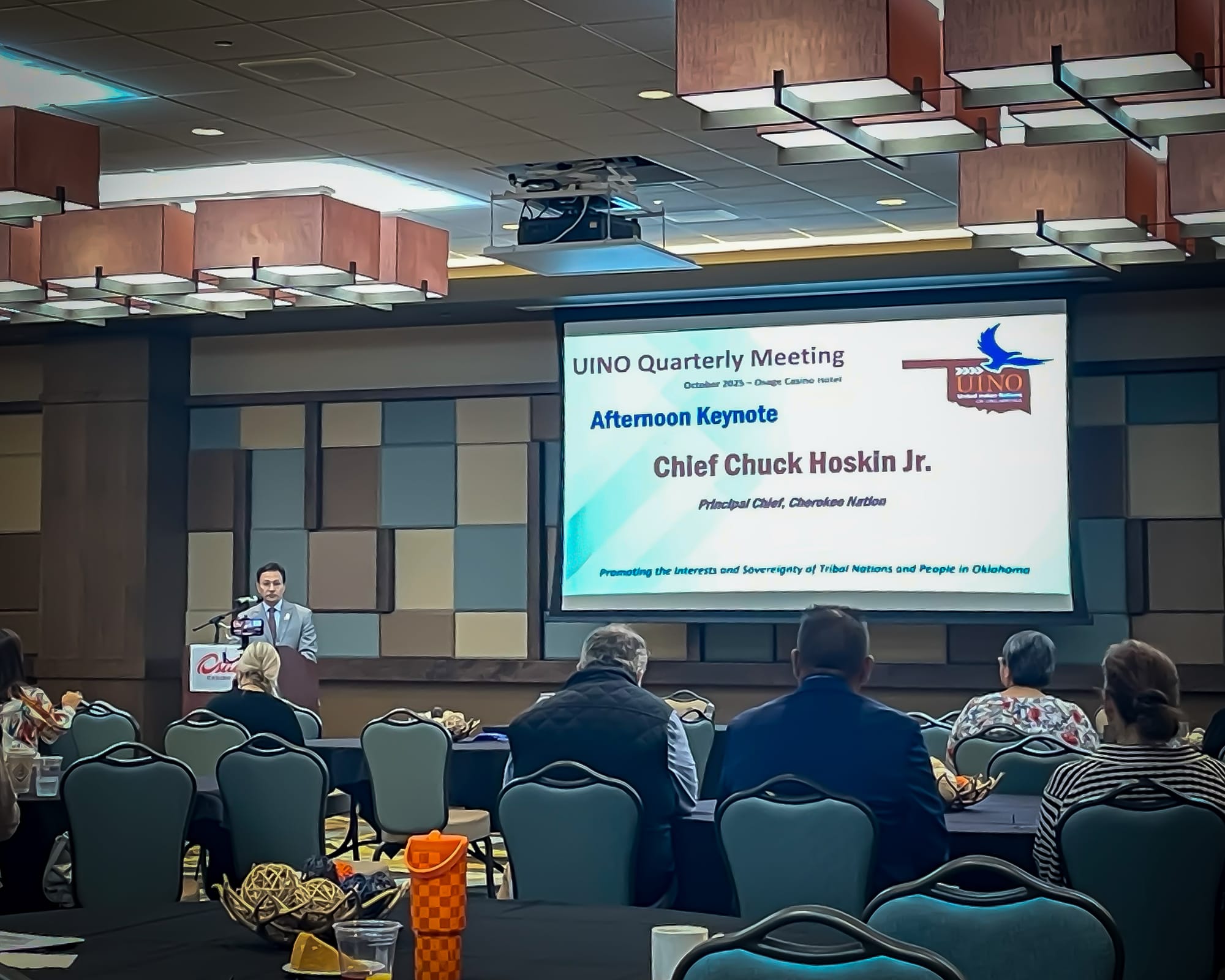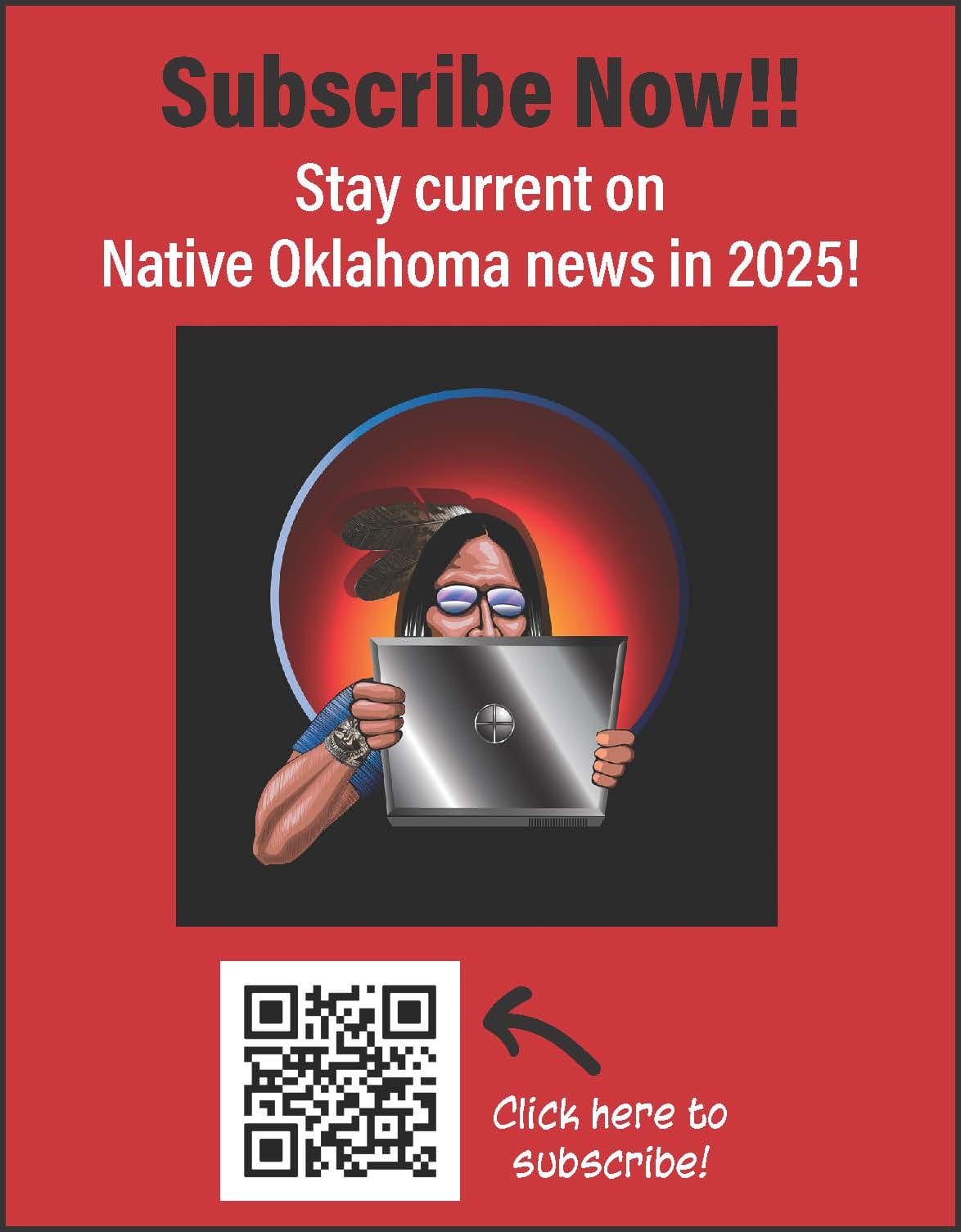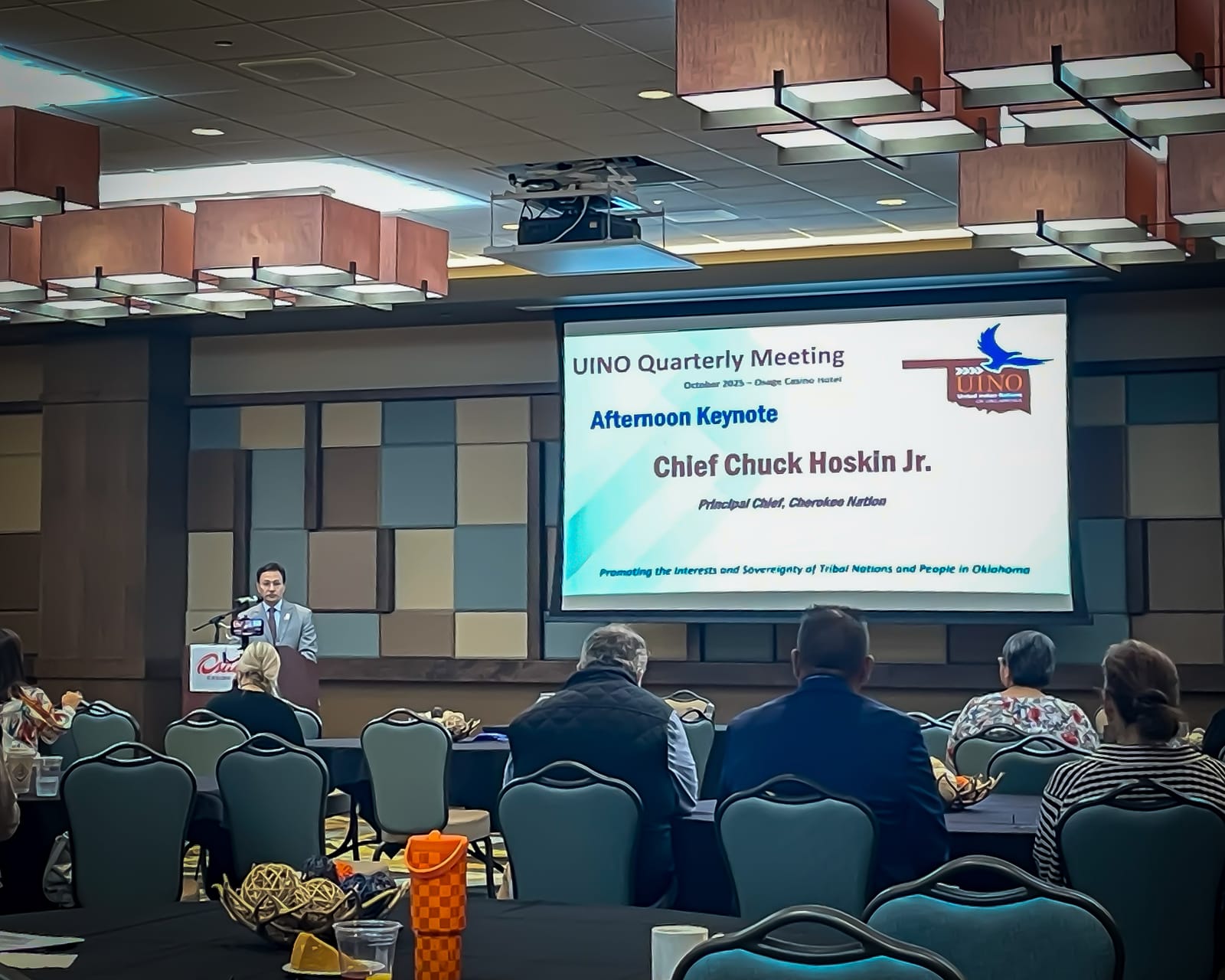
By Troy Littledeer | @kituwahpunk
TULSA, Okla. — As a federal government shutdown freezes services for millions across the country, tribal nations in Oklahoma are keeping their doors open, with leaders attributing their stability to self-governance, tribal business revenue and advance appropriations for key federal health services.
At the quarterly meeting of the United Indian Nations of Oklahoma (UINO) here, federal and tribal officials emphasized the contrast between the ongoing dysfunction in Washington and the operational capacity of tribal governments and tribal-run health systems.
Rear Adm. Travis Watts, director of the Indian Health Service (IHS) Oklahoma City Area and a citizen of the Choctaw Nation of Oklahoma, opened the meeting with a clear message: “Our facilities are open. Our services are not disrupted.”
“The current lapse in appropriations has not impacted IHS from a standpoint of our services or facilities,” Watts told attendees. “The advance appropriations allow us to keep our doors open at this particular time. We want to thank the tribal nations for their advocacy for those advance appropriations.”
Watts noted that the Oklahoma City Area, which covers Oklahoma, Kansas, and parts of Texas, Nebraska and Missouri, accounts for roughly 25% of all IHS patient visits nationwide. Eight of the area’s nine hospitals are tribally operated, making it one of the most tribally driven IHS regions in the country.
IHS is one of the few federal agencies with nearly 15,000 employees nationwide that remains fully operational during the shutdown, a result of advance appropriations secured through recent congressional action. “If they weren’t, we’d be under the same pressure as other agencies, as far as closing doors and reducing services,” Watts said.
‘Tribal Nations Are Leading by Example’
Chuck Hoskin Jr., Principal Chief of the Cherokee Nation, highlighted tribal resilience and contrasted it with federal gridlock.
“You only have to think about what’s going on right now to remember how important this is,” Hoskin said. “As we speak, the tribes in the state of Oklahoma are open, and our books are balanced. You can’t say that about Washington, D.C.”
While federal agencies are shuttered or scrambling, Hoskin said, tribal nations are delivering essential services and sustaining communities. He suggested tribal governments may be “filling even more gaps” if the shutdown persists.
The chief invoked the 50th anniversary of the Indian Self-Determination and Education Assistance Act of 1975, calling it “one of the most important and consequential” laws for Indian Country.
“It’s remarkable to think that 50 years ago, a divided government — a Republican president and a Democratic Congress — could come together to do something so consequential,” Hoskin said. “They didn’t do it out of charity. They did it because Native people pushed for it.”
That self-determination authority has allowed tribes like the Cherokee Nation to build extensive, self-sustaining health systems, schools and infrastructure. Hoskin noted the Cherokee Nation’s health care system now generates about $400 million in third-party revenue annually.
“That’s economic activity that stays in the state,” Hoskin said. “It doesn’t go to shareholders or CEOs. It goes back into our communities — into clinics, behavioral health, language programs, and parks. That’s the difference between a top-down federal model and tribal self-governance.”
The Call for Permanent Forward Funding
While praising advance funding for insulating tribal health services, Hoskin cautioned that not every tribe has the same resources. Many smaller, direct-service tribes depend entirely on IHS to deliver care.
“Thank goodness for forward funding,” he said. “But we have to make that permanent in federal statute. No one in this country should be at the mercy of political dysfunction to get health care.”
He also emphasized that the Cherokee Nation’s community investments — $70 million over three years for housing, water systems, food security and public safety — are funded through tribal business revenue, not federal dollars.
“The United States can keep its lights off,” Hoskin said. “We’ll still be moving forward.”
NCAI Mobilizes for National Relief
The implications of the shutdown extend beyond Oklahoma. Geoffrey Blackwell (Muscogee Creek Nation, Chickasaw, Omaha), chief legal counsel for the National Congress of American Indians (NCAI), addressed tribal leaders on the national outlook.
“I’m ever an optimist,” Blackwell said, “but it’s not clear when this shutdown is going to end.”
Blackwell, who served as a federal employee during previous shutdowns, stressed the importance of tribal leaders maintaining relationships with federal agency staff who implement the trust responsibility. “This is a tough time for them,” he said. “Reach out. Let them know you’re still here — and make sure they’re still here, too.”
NCAI has mobilized resources, including a webinar detailing funded accounts and providing template letters for congressional advocacy. Through the Coalition for Tribal Sovereignty, NCAI is pressing Congress to provide advance appropriations for all tribal funding, including programs at the Bureau of Indian Affairs and Bureau of Indian Education, and to exempt tribal-serving positions from cuts or furloughs.
“A shutdown is not politics as usual,” Blackwell said. “It’s a failure to honor treaties that puts Native lives, tribal governments, and community safety at risk. Our message is simple: Honor the trust. Fund the future.”
Policy Priorities Beyond the Crisis
Blackwell emphasized a broader policy agenda that must resume once the immediate crisis passes:
- Ending crisis budgeting: Advance appropriations and full-year funding for all tribal programs.
- Safety and justice: Expanded tribal criminal jurisdiction and improved coordination to address the crisis of Missing and Murdered Indigenous People.
- Economic development: Infrastructure investments and reforms to remove financial barriers like dual taxation.
- Health care: Sustained IHS funding that meets the actual cost of care.
“Shutdowns don’t pause our obligations to our people,” Blackwell said. “And they must not pause the federal government’s obligations to tribal nations.”
Policy Priorities Beyond the Crisis: A Full Agenda
The discussion on the federal shutdown and stable health care was only one part of a comprehensive agenda addressing the full scope of tribal sovereignty. Beyond the urgent calls for permanent advance funding, the quarterly meeting covered several other critical priorities:
- State Legislative Action: Lawmakers discussed a ballot initiative to make Oklahoma’s partisan elections an open primary, allowing voters to receive one ballot regardless of party affiliation.
- Tribal Leadership and Budgeting: Leaders received updates on tribal representation on federal committees and councils, with a focus on planning the Tribal Interior Budget for the upcoming fiscal year.
- Law Enforcement and Safety: A session addressed tensions from gang violence, guns and drugs, emphasizing federal cutbacks in law enforcement and high mental health risks, with a direct query to attendees: “How can we keep our communities safe?”
- Federal Commitments: Cherokee tribal member Tyler Scribner, CEO of Tribal Sovereign Data, delivered a luncheon address titled, “Balancing Books or Breaking Promises? An Economic Perspective,” examining the U.S. government’s legal obligations to tribes and congressional appropriation processes.
- Future Healthcare: The IHS session extended beyond the shutdown to discuss forecasting changes in the Indian Health System, including realignment processes and a proposed New Tier Structure that would reshape area delivery and operations.
- Voter Initiatives and Workforce: Executive Director Margo Gray updated attendees on the “Warrior Up to Vote” statewide voter drive continuing through the 2026 election, while the Oklahoma Workforce Commission presented its initiative to coordinate the state’s workforce system.
“If you showed most Oklahomans what tribal governments are doing,” Hoskin concluded, “they’d say, ‘I want that government to represent me.’”








